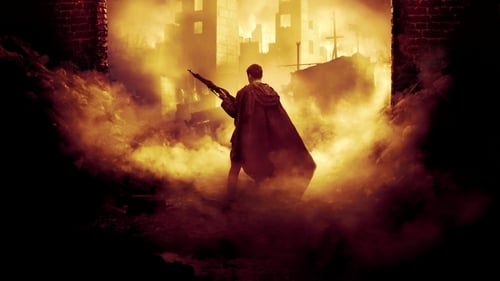Light over Koordi (1951)
Gênero : Drama
Runtime : 1H 33M
Director : Gerbert Rappaport
Sinopse
When Paul Runge, a soldier of the Red Army, returns home to Koordi after the war, he sees that, despite the new regime, life in Koordi hasn't changed. It's still a abandoned, uncultured Estonian village, where rich landlords still oppress the population. Runge starts talking about founding a kolkhoze.

Vasily Zaitsev é um jovem atirador russo que, convencido por um companheiro político, torna-se o ícone da propaganda russa em plena 2ª Guerra Mundial. A fama de Vasily o torna uma lenda viva para o exército russo e desperta também a atenção do exército nazista, que envia seu melhor atirador de elite com o objetivo de matar aquele que se tornou a esperança de toda a Rússia.

An ethnographic treasure that documents with visual bravado the harsh conditions of life in the isolated mountain village of Ushkul.

Between 1944–1953, courageous resistance movement took place in the Baltic region of Europe, uniting the partisan troops for struggle against the Soviet Union. “The Invisible Front” was a coded name used by the Soviet Interior forces to describe the resistance movement in Lithuania. Film depicts the story of the fighters through the words and experience of the partisan leader, Juozas Luksa, and interviews with eyewitnesses of those events - both the partisans and the Soviet fighters. Tales of horror, torture and courage are told in the rare archival footage that has never been screened before, and interviews with the surviving members of the resistance movement.

Film deals with Stakhanovite movement. Old miners try to sabotage young man's plan to renew methods of getting coal.

A young Belarussian man joins Soviet partisans in order to fight Polish occupational forces in Belarus.

"Se amanhã houver guerra" [Если завтра война] foi produzido nas vésperas da II Guerra Mundial. É um "típico" filme de propaganda patriótica bélica; sobre a capacidade da URSS de repelir qualquer agressor (dastaque para os alemães). Documenta treinamentos, desfiles, recrutamento e o preparo do Exército Vermelho para a guerra iminente. Dzigan, no início da década de 1930, havia feito filmes sobra a emancipação feminina tais como "O julgamento deve prosseguir" [1930, Женщина] -- camponeses, nas fazendas comunitárias -- e "Mulher" [1932, Суд должен продолжаться] -- citadinos, sobre o machismo e outros costumes burgueses. Na segunda metadade dos anos 30, Dzigan é designado como diretor de filmes militares, como "Nós somos de Kronstadt" [1936, Мы из Кронштадта] e este, o qual foi co-dirigido por Efim Dzigam [Ефим Дзиган], Lazar Antsi-Polovskiy [Лазарь Анци-Половский], Nikolay Karmazinskiy [Николай Кармазинский] e Georgi Beryozko [Георгий Березко].

Writers: Jaroslav Zrotal

Vladimir Ilyich Ulyanov, better known as Lenin, is remembered as the instigator of the October Revolution of 1917 and, therefore, as one of the men who changed the shape of the world at that time and forever, but perhaps the actual events happened in a way different from that narrated in the history books…

Film by Aleksandr Medvekin to a metonymic Chinese friend, advocating against Mao and the Ussuri River Skirmish.

Director: Vaclav Gajer

Poland in the 50s, 20th century The process of collectivization of agriculture is under way. The wealthy Slumdog farmer is one of the last individual farmers who have not joined the cooperative and are trying to grow their own land. But it is very difficult - the unemployed mercenaries who paid for them run to cooperatives (where they have better conditions), the environment or the local authorities do not accept him as a kulak. Struggling with the problem of how to make a 40-hectare farm last, he remains alone in the face of a loss of land that he cannot cultivate.

In the late 1950s, the collectivization of agriculture is in full swing in the East German village of Willshagen on the German-German border. Those in charge have to face many obstacles, especially from a large-scale farmer who is unwilling to join the co-op. All of a sudden, mysterious men in a fancy car appear in the village and show an interest in the rundown manor house. Gossip spreads quickly, and some villagers think there will be a re-parceling of properties and a land swap with West Germany. They assume everything will go back to how it used to be and even expect the count to return to his manor. In preparation, the situation in the village escalates at a fevered pitch.

When Paul Runge, a soldier of the Red Army, returns home to Koordi after the war, he sees that, despite the new regime, life in Koordi hasn't changed. It's still a abandoned, uncultured Estonian village, where rich landlords still oppress the population. Runge starts talking about founding a kolkhoze.








